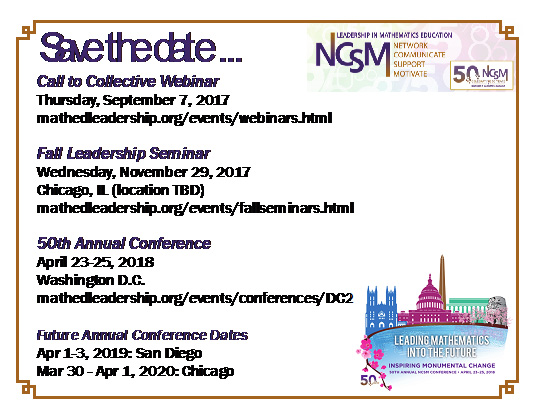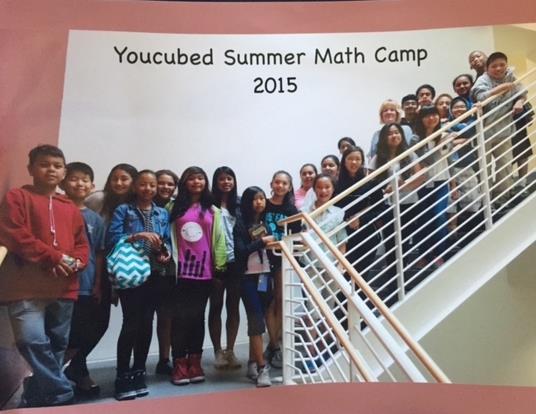News from the Western 1 Region
Sandie Gilliam, Western 1 Regional Director
Fall 2017
Hello Western 1 Members. Hope your new school year is off to a sunny and productive start.
Your State Team Leaders and I discussed the idea of sending out a different kind of message-one that has a few bullets with descriptions enough for you, if interested, to click on in order to read further. We all realize that information has inundated your life these days, so you may postpone reading, choose to read things quickly to gather the gist, or read things fully-your choice. Let me know what you think of this new format ().
- Need a reminder of the important NCSM dates: Webinar, Fall Leadership Seminar, and Annual Conferences? This Save the Date Postcard is viewable and printable.
- Interested in piloting a new Professional Development Module, Geometric Measurement and Spatial Reasoning in Elementary Mathematics Teaching. designed to support the work of K-5 math teacher leaders and professional developers starting Fall 2017.
- Read My Vision for Jo Boaler’s YouCubed Summer Math Camp. It worked for my high school math classes; wonder about how it worked with middle schoolers.
- You should have received an email from NCSM on or around September 1 titled "2018 NCSM Conference Registration is Open." Remember, it’s first come, first served on Meals Provided. So, if you want meal tickets, register early!
Postcard
Professional Development Module
Our NSF-sponsored project, the Dev-TE@M project at the University of Michigan School of Education, has an opportunity we believe would be of interest to the NCSM membership you serve through your role as Regional Director. We are piloting a new professional development module designed to support the work of K-5 math teacher leaders and professional developers starting Fall 2017, Geometric Measurement and Spatial Reasoning in Elementary Mathematics Teaching. This module, featuring the work of Douglas Clements and Julie Sarama, is particularly well suited to teacher professional development that aims to help teachers learn about – and teach – geometric measurement and mathematical practices featured in the CCSS-Math Standards. We are recruiting professional development providers who work with practicing elementary teachers to participate in the pilot during the 2017-2018 school year.
The module focuses on the following content:
- Mathematics: concepts, methods, and tools used in linear, area, and volume measurement
- Student thinking: understanding trajectories of children’s reasoning about linear, area, and volume measurement
- Teaching practice: using learning trajectories in assessment and curriculum analysis
- Learning from practice: studying learning trajectories of one’s own students through the use of video and anecdotal notes
View a short video about Drs. Clements and Sarama’s work
If you believe this might be a good fit for NCSM members in your region, please pass along our flyer (attached) to the members in your region and/or share it with others who might be interested in piloting the module with PLCs, school/district/university-based PD, or other professional development configurations. There is no charge for using the Dev-TE@M module as a pilot tester and we are offering $100 stipends for teachers who participate in the PD.
Thank you for your time. Please let me know if you have any questions,
Tim Boerst
Timothy A. Boerst, Ph.D.
Professor of Clinical Practice in Education
National Board Certified Teacher
Chair, Elementary Teacher Education
1221A School of Education
610 East University
University of Michigan
Ann Arbor, MI 48109-1259
office phone (734) 615-9048
fax (734) 615-7441
My Vision for Jo Boaler’s YouCubed Summer Math Camp
In my June message to you, I wrote a bit about my experiences at the YouCubed Summer Math Camp at Stanford University. What I didn’t elaborate on were the challenges presented and continuing contributions to the field that I experienced.
I was a high school teacher for 32 years in California before moving to Colorado in 2007. Hence at the time of this math camp, I had been out of the K-12 classroom for eight years. In addition, I had never taught middle school. I had two reoccurring dreams weeks prior to camp, mostly about students goofing around and uncontrollable, students spending their warm and wonderfully free summer learning more about their least favorite subject, and middle schoolers who couldn’t understand my high school train of thought about math and therefore couldn’t follow where I was leading. Still I persevered!
My achieved vision for my high school classes was threefold:
- Use of an engaging, comprehensive, problem-centered mathematics curriculum that connects to the real world and other school subject areas, such as science. In this curriculum, students are given an over-riding problem that is provocative enough for them to find a solution. This problem functions as a means and a reason to learn the necessary mathematics, discover a viable approach, and then apply the mathematics concepts to their approach towards the solution.
- Creation of an environment that encourages students to ask questions. Students’ natural curiosity fosters good questions. It puts the students in a state of temporary confusion that can only be resolved through asking thoughtful questions. When asked aloud, students’ questions invite others to share in the quest of the solution or in the answer to the problem. Many times, I find that my answer to my student’s questions is another question – a question to make them continue their journey. There is an art to responding to a question. Without being evasive, I try to lead them. They know that I ask a question so that they’ll feel the pride and satisfaction that comes when they discover the answer for themselves. It is never the same feeling one gets when the teacher solves the problem. That feeling of self-accomplishment that comes through discovery is powerful learning and it encourages the students to ask more, listen more, reflect, and continue learning. As a result, my students grew in their communication and presentation skills, and learned how to work as a team to solve problems.
- Working on skills that business desires in future workers, grounded in the Secretary’s Commission on Achieving Necessary Skills (SCANS) report, which suggests that business wants workers who can work cooperatively, and communicate both verbally and in written form. Students were constantly in front of the classroom presenting their work, explaining their thinking, and exploring new solutions through lateral "out of the box" thinking. Because they discuss the mathematics and the strategies that might be useful, they tackle problems with determination. "No, not word problems. I hate doing word problems" is what I used to hear. With extensive work using a problem-based curriculum, I heard, "Can’t you give us more real-life word problems in this section? I understand better when I can put the mathematics into context."
In my high school classroom, I put this vision into practice at the beginning of the school year, knowing that it may take students months to understand and more months to feel comfortable putting into action. But what would happen with the middle schoolers? I would only have them for a month and extremely little, if any of this, had been established as a classroom norm in prior math classes.
When Jo Boaler first came to this country in the late 1990s and joined the faculty at Stanford University, she heard about the work I was doing in the classroom, and she and her graduate students became frequent visitors, videotaping and talking with students and myself. These treasured interactions became vital learning opportunities that forever impacted my ability to listen intently to students’ explanations with an eye on their current understanding, to determine the goal I wanted to realize, and to envision the possible paths that would lead to its attainment.
I moved back to California for 5 weeks, lived in Stanford graduate housing, and treasured every moment of the time back in the classroom! I am forever grateful to Jo Boaler for this opportunity to continue my growth as a math teacher and to the 23 middle school students in my classroom for following my vision.
To hear more details about summer camp, and mathematics conversations from the middle school students, I will be speaking at the April 2018 NCSM conference in Washington D.C.


